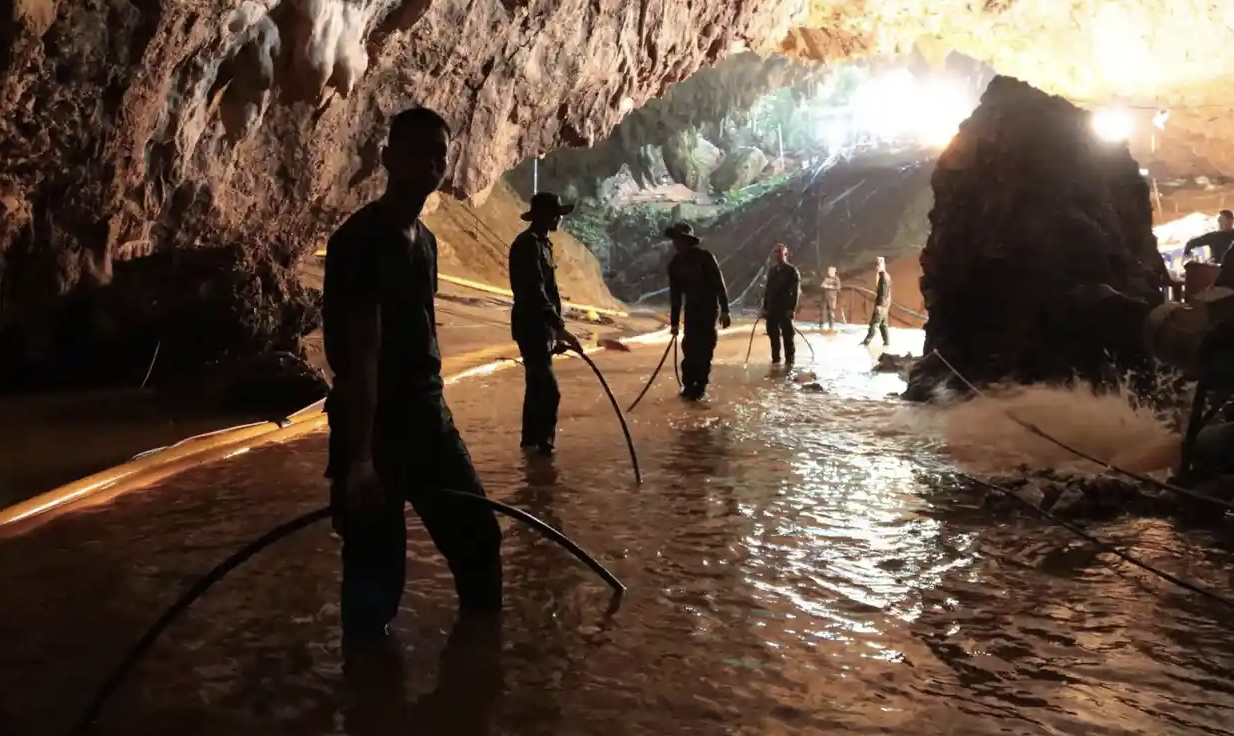In the summer of 2018 a news story from Thailand captivated the world. On June 23, in the afternoon after practice, twelve soccer players, range in age from 11 to 16, and their coach went for an impromptu hike into the Tham Luang Nang Non cave. They only brought some rope and flashlights—the whole outing was only going be a few hours. But as they explored, the rains came, and the cave was flooded. They were trapped, in darkness, on a narrow ledge in an air pocket above the flood waters, nearly a mile underground.
At first they didn’t panic, thinking the water would recede after the rain stopped. At most they would be trapped overnight. But then a day went by, the two, then three. They were thirsty and hungry. As the flashlight batteries died they were plunged into complete darkness. On the surface outside the cave, the parents’ panicked cell phone calls and texts had begun the moment the boys didn’t show up for dinner. Learning the kids had gone caving, they arrived at the mouth of the underground labyrinth to find the boys’ abandoned bicycles, but no kids in sight. Were they lost? Trapped? Dead? Within minutes, several park employees emerged from the cave to confirm their fears—the boys were at least trapped, and possibly did not survive. The cave was flooded and there was no way to get them out.
The rescue operation took three days to begin in earnest. Pumps pulled 400,000 gallons an hour from the flooded underground tunnels—an enormous deluge that was enough to fill a house every three minutes. Even at that the pumping only kept the water level at bay; there was far too much water to pump the caves dry.
Navy SEALS were brought in, along with experts and rescuers from throughout the region. It took nine days just to reach the boys and their coach, and confirm, on July 2, that all 13 were alive. They had been more than 200 hours in the cave. They licked water dripping from the limestone walls. The air was running out. By then more than 9,000 volunteers were at the site, along with 1,500 members of the media. Divers began bringing in food, oxygen, water, through a passage that narrowed at one point to just under two feet wide.
Photo: Shutterstock.com
On July 7 after much planning and staging of equipment, the work to bring to boys out alongside divers was underway—but it would still be difficult and dangerous. One SEAL rescuer had died in the narrow, flooded passages as his air gave out. Each child’s journey to safety took over two hours. But after three more days—and over two weeks since they went in—all of the boys and their coach were brought out safely. Throughout their ordeal, as we all watched on television, we imagined what it must have been like to be trapped there, underground, with no hope of rescue, for days on end.
The cave rescue was an amazing true story. And interestingly it parallels a story from the Old Testament of the Bible, and when you place the two accounts side by side, the biblical account seems all the more plausible. Remember the story of Jonah? Trapped in the belly of a great fish for three days. A small pocket of air, total darkness for hours. Could the story be real and could Jonah have survived? After all, the boys survived after being trapped for 250 hours—Jonah’s ordeal was around 72 hours at most.
While the soccer team was trapped by a surprise rain, Jonah was trapped for a far different reason. Given specific instructions by God, he chose to disobey. He didn’t procrastinate on God’s directive—“Okay God, but I’ll do it later”; nor did Jonah deflect God’s instruction—“Instead of that God, why don’t I try this instead…” No, Jonah had clear and direct instructions from God and said, “no”. Not too many hours later he finds himself sitting in the belly of a fish. For three days. Perhaps the greatest lesson in the story of Jonah is what happens when you defy God after He’s told you precisely what He desires of you.
The reality is that when it comes to God’s will, God’s direct instructions to us, we know most of it. The Bible is filled with many specific instructions from God. And in case it seems too complicated, Jesus Himself gave us the Cliff Notes version: “Love the Lord your God with all your heart and with all your soul and with all your mind. This is the first and greatest commandment. And the second is like it: Love your neighbor as yourself” (Matthew 22:37-39). Do you ever think about how often we deliberately and directly disobey God? What is the practical price of that disobedience?
If you’ve ever felt like your life is not moving forward, that you are stuck, consider that you may be sitting in the fish, figuratively. Has God given you specific instructions that you aren’t following? Is there an area of your life that is given over to disobedience or ungodliness? The result of Jonah’s disobedience was that he was forced to wait on God. To sit it out in a dark place, unsure of how he would get out of his predicament. The Bible is clear that there is always a penalty for sin. Jonah and the fish is a vivid picture of God’s often-used consequence of waiting. And that waiting is chiefly for your obedience.
Cover photo: Shutterstock.com















A hack is a clever trick or shortcut for accomplishing something. There are hacks for smartphones and cooking and driving. What about in your leadership? Is being a good leader something that has hacks?